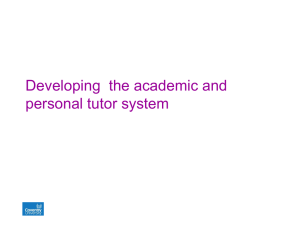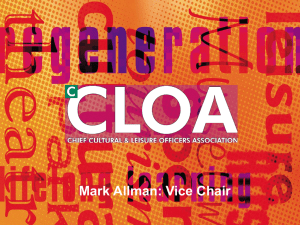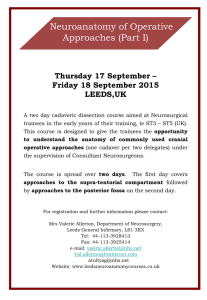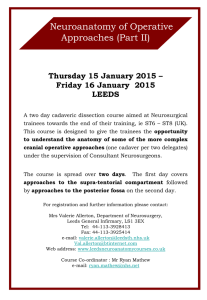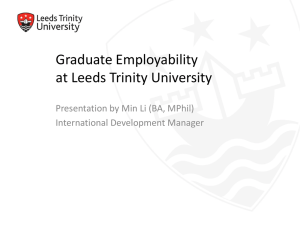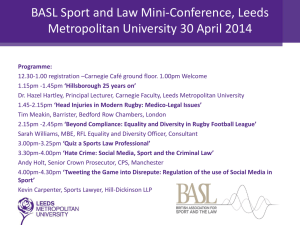Hydration Pres for N.. - The National Association of Care Catering
advertisement
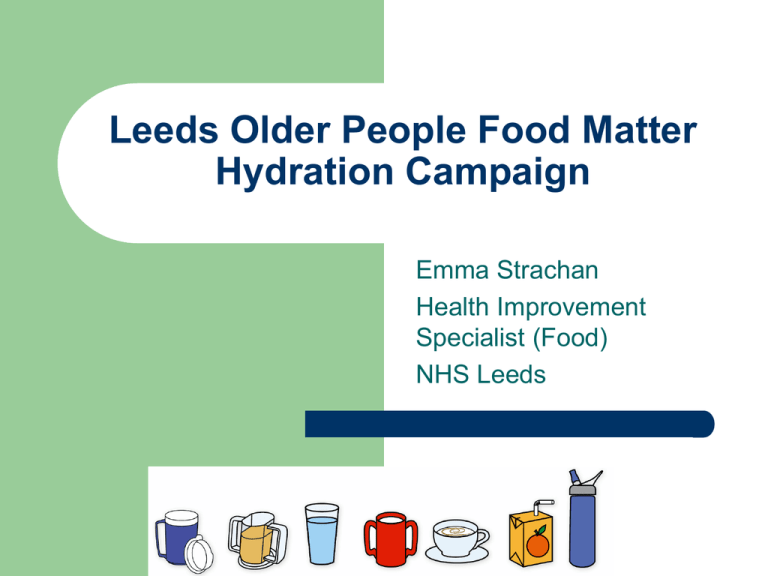
Leeds Older People Food Matter Hydration Campaign Emma Strachan Health Improvement Specialist (Food) NHS Leeds Aims and Objectives To introduce the governance arrangements for older people focused work in Leeds To share information on the Leeds Food consensus and the underpinning principles within the consensus. To give an overview of the development and implementation of the dehydration awareness campaign throughout June this year To share the groups next steps and plans for the forth coming year Older People and Food Work in Leeds Shadow Health and Well- Being Board Outcome: People will live full, active and independent lives Priority: Increase the number of people supported to live safely in their own home Indicator: Rate of hospital admissions for care that could have been provided in the community Aging Well Board Outcome: Improve the health and wellbeing of older people in Leeds. Priority: Promote Health and Active aging Information and advice about the importance of good nutrition and adequate hydration should be readily available. All advice should be clear, easy to understand and be consistent with the principles of the Leeds Food Consensus Statement for older people. Leeds Older People Food Aim: Develop a coordinated approach to food work for older people based on needs Objective: Ensure key food messages relevant to older people are promoted Older People in Leeds According to Bapen 14% of population aged 65yrs and over are malnourished Over 65 population in Leeds =115,246 Therefore 14% = 16,134 malnourished older people in Leeds Introduction to the Food Consensus Diverse nutritional needs of older person in community both Nutritionally ‘well’ Nutritionally ‘vulnerable’ Seeking to ensure consistent evidence based, person centred, food messages for older people Leeds Food Consensus Why develop a consensus: Keep the public nutritional well Act for those who are nutritional vulnerable Ensure consistency of message Raise awareness that nutrition is not just about food Raise awareness that nutrition is part of everyone’s business Older People and Food Action Plan Objective: Ensure key food and drink messages relevant to older people are promoted Action: Plan, develop and evaluate a dehydration awareness campaign for Older People. Undertaking campaign activities that particularly link to the self management agenda and the Integrated Health and Social Care demonstration sites. Why focus on Dehydration Dehydration has serious health and well-being consequences One of the key principles of the Food Consensus which often gets lost In 2009 1.9 million was spent on treating people admitted to hospital with symptoms of dehydration. In 2010/11 4.9 million was spent treating urinary tract infections The importance of hydration is recognised in Care Quality Commissions – Essential Standards of quality and safety under outcome 5 which seeks to ensure that nutritional needs are met National Association of Care Catering announced that they would be re-running there Dehydration Hydration in Older People Awareness Week Build on good practice and recommendations from last year’s work 2011/12 Hydration Campaign recommendations Actively support a repeat of dehydration awareness week next year, over a longer period of time for example the full month of June. Obtaining some feedback from frontline workers on resources, tools and information they require to raise awareness of the importance of keeping properly hydrated. Sending information packs to all GP surgeries, Sheltered Housing and Neighbourhood Network Schemes. Hydration Campaign 2012 What we did? Obtained a budget of 8K (actually spent £5,435) Developed a plan in partnership between Public Health, Leeds Community Health Care and Leeds City Council Pooled existing resources Held a focus group with key frontline staff to hear there views on new tools and resources which were required (January 12) Developed new resources Developed a communication plan for the campaign across LCC and NHS Consulted with key partners Shared information packs during National “Dehydration Awareness Week” Evaluated the information in the packs Focus Group findings Information in the existing Spotting Signs of Dehydration Leaflet was good, but this needed to be simplified Big myths around drinking and incontinence Important to think about how drinks are served and not simply focus on how often drinks are often Suggestion to develop a tool to audit drinks taken and act as prompt to remind the older person to have a drink Important to share the information amongst all organisations who work with older people across the community, health and social care settings Resources included in the Pack Spotting Signs of Dehydration Drinking more for Dryness Including the Support and Enable message Quiz How many glasses of fluids should you drink each day for good health? □1–2 □3–4 □6–8 How should you drink your daily fluids intake? □ All at once □ Little sips regularly How long can you live without fluids? □ About 1 week □ About 1 month □ Big mouthfuls □ About 1 year Which of these is not a sign of dehydration? □ Headache □ Irritability □ Tiredness □ Sprained Ankle What is the ideal colour for urine to be if you are well hydrated? □ Light Brown □ Dark Yellow □ Pale Yellow/Clear Who did we distribute the packs to? Pack was available via: The Public Health Resource Centre for staff to collect One pack sent to each GP practice and Pharmacy across Leeds Packs sent to all Leeds Community Health Care services Packs shared amongst Adult Social Care Packs circulate to Leeds Teaching Hospital Trust Packs shared with Integrated Health and Social Care Teams Integrated Health and Social Care Teams •GP practices across Leeds are starting to use the tool to identify patients at risk of becoming more unwell/ needing more care Person receiving care and support Systematic self-management •First three demonstrator sites now working together • Initial focus on people with long-term conditions Other resources Support poster - NACC Food Consensus leaflets Lanyards DVD of resources Drinks Tracker Tool Drinks Tracker Evaluation Tools and packs have enabled lots of new partnerships i.e. links to training opportunities Quiz enabled staff to test knowledge Resources were welcomed and used in many different ways to creating displays in patient waiting areas to briefing staff and older people on the key messages Resources were described as high quality and needed Currently finalising end of campaign report, hoping to retest awareness in January as 6 month review. Award Winners In September we were awarded the National Association of Care Caterings Hydration Award for out work This has really helped us to raise awareness of the agenda and to obtain funding for future campaigns Groups next steps Launching a malnutrition campaign to coincide with the Nutrition Day organised by NACC Continuing to champion the Older People and Food agenda by promoting the Leeds Food Consensus Undertaking some food access work to enable older people to access food and drink right for their stage of life particularly during the winter months Thank you Any Questions

